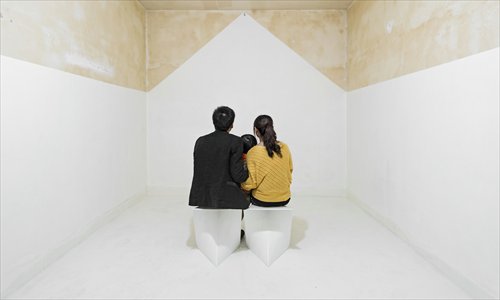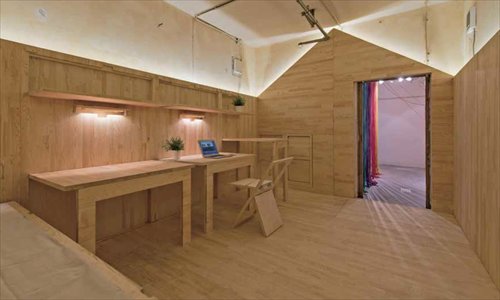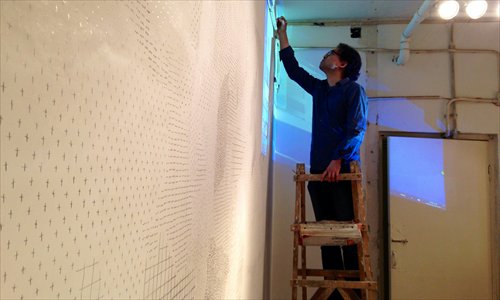Room for improvement
Artist gives Beijing basements a creative makeover

A family sits in the room designed to be a movie theater.Photo: Courtesy of Zhou Zishu

A room has been changed to serve social purposes. Photo: Courtesy of Zhou Zishu

Zhou Zishu takes measurements of a room in the basement. Photo: Courtesy of Zhou Zishu
Zhou Zishu has no idea how he had become popular on the Internet. He had done a makeover on one of the basement dwellings in Wangjing, Chaoyang district, Beijing, and sent out a few tweets of his work. When the media picked it up, his photos spread everywhere online.
He was called many names. His action was seen as an act of charity, and perhaps as a solution to the thorny issue of basement dwelling. But Zhou himself said he only wanted to ensure "spatial justice," building a space that everybody could use, where people living underground and above ground could interact.
Starting point
The idea was developed as project for a class. The 34-year-old artist, who had worked as a designer at the National Art Museum, had opened up his own art studio and went back for a second master's degree at Central Saint Martins College of Art and Design in London.
The major was about how to turn a "space" into a "place" through design and strategic planning. "A 'space' is an abstract concept, where nothing happens. A 'place' is where stories happen," Zhou said.
For his thesis project, Zhou chose to "make sense of the basement dwellings" through design.
Basement dwellings have been an issue in Beijing for a long time. In 1986, the government ordered all buildings of over 10 floors to have air-raid shelters, which later were divided into cells and rented out to migrant workers with the government's encouragement. Then, when conflicts gradually emerged, the government started banning them, but to little effect.
Zhou found the basement dwellings to be the center of several conflicts. The government wanted to shut them down, but the people needed a place to live, and the landlords who had previously signed contracts with the government stood to lose a fortune. But he saw that each side had its own reasons and wanted to propose a plan to solve the conflicts.
With that thought, field research began.
Changing the space
Lin Mucun had never been down to a basement before, even though her own building had one. Lin had graduated from the China Central Academy of Fine Arts. While most of Lin's classmates went on to conduct high-end exhibitions, Lin's first job as Zhou's assitant, was to talk to people living in the basements.
Starting in September 2013, Lin went around Wangjing exploring basements, first with a friend, then eventually going by herself.
At first she thought all types of people lived in the basements. She had moments of nervousness, standing at the top of the stairwell, not wanting to go in.
"Mr. Zhou was always persistent in telling me, 'You have to talk to them,'" she said. "We thought it was an important part of the project." She then found the friendliest-looking person in the basement and started talking to him.
The person turned out to be an auto repair worker in his 20s. He has lived in Beijing for seven years but had never visited any of its tourist sites besides the Forbidden City. He lived away from his colleagues because "all they talked about was money and women," while he liked to read Buddhist scriptures.
It was people like this worker that made her go on with the research, Lin said.
Zhou made a map of where the basements were located and knocked on doors to talk to landlords.
"Most were uncooperative. They poked their heads out to see what was going on, but were afraid of any trouble," he said.
But eventually, he found someone. Liu Qing, a 30-year-old landlord in Huajiali, didn't shy away when Zhou visited. In fact, he invited them in.
His room was dirty, wires were spread on the walls like snakes, and there was even a knife pressed against them. Zhou started telling Liu about the project, and they talked for two hours.
The first encounter didn't yield any results. Days later, Zhou went for a second time, and was surprised to find the landlord had put out a small blue carpet at the entrance of the basement.
This act prompted Zhou to cooperate with Liu. He said he felt Liu's hospitality and desire for change.
Community shifts
Zhou and his team got busy. The team turned the basement into a "horizontal skyscraper," dividing the corridor into sections and marking out eight "floors" on the ground in bright numbers. They also painted the floors and some of the doors.
Now, when the dwellers leave for work in the morning, they see a blue corridor, signifying hope. When they come back at night, they are guided home by a warm, yellow color.
The corridor had been dark and messy before, and some rooms filled with trash. The walls were now whitewashed and rooms made into communal areas.
Some rooms were made for "skill exchanges," where people could go and learn things from each other, from barbecuing to foot massaging.
At first, the dwellers were wary. But as the team went on, people started talking to each other, Zhou said, and even brought the team beer and fruits.
It was never meant to be a charity project, Zhou said. His aim was to find a viable and sustainable way of solving conflicts involving basement dwelling.
"At first we wanted to spread knowledge among the dwellers on how to live better. But as the project went on, I gradually realized that charity work would not solve the issue," Zhou said.
But there is no doubt the community had been affected by the project."Liu has changed. He started giving lifts to people too drunk to drive. It may not be a big change, but it's something," Zhou said.
The project also won support from people living in the building abvoe ground, as well as young people in the community. Zhou has been contacted by groups offering him funding to continue. A few basement owners also talked with him, hoping he would help give their basements a makeover.
Next, Zhou is thinking about building living spaces on top of shopping malls, to provide housing for migrant workers serving the local community.
Zhou said he will keep in mind what a therapist in the basement told him. "Maybe most people will regard it as meaningless, but even if only one person benefits from it, then it's worth the try," he said.